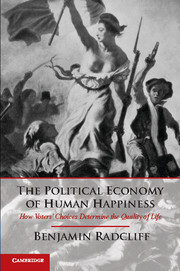Book contents
- Frontmatter
- Contents
- Acknowledgments
- Introduction
- 1 The Democratic Pursuit of Happiness
- 2 Market Democracy
- 3 Citizens or Market Participants?
- 4 The Scientific Study of Happiness
- 5 The Size of the State
- 6 Labor Unions and Economic Regulation
- 7 The American States
- 8 Between Market and Morality
- References
- Index
1 - The Democratic Pursuit of Happiness
Published online by Cambridge University Press: 05 March 2013
- Frontmatter
- Contents
- Acknowledgments
- Introduction
- 1 The Democratic Pursuit of Happiness
- 2 Market Democracy
- 3 Citizens or Market Participants?
- 4 The Scientific Study of Happiness
- 5 The Size of the State
- 6 Labor Unions and Economic Regulation
- 7 The American States
- 8 Between Market and Morality
- References
- Index
Summary
In some of the most familiar and inspiring sentences in the English language, the American Declaration of Independence expresses the spirit of a new political age:
We hold these truths to be self-evident, that all men are created equal, that they are endowed by their Creator with certain unalienable Rights, that among these are Life, Liberty and the pursuit of Happiness. That to secure these rights, Governments are instituted among Men, deriving their just powers from the consent of the governed, that whenever any Form of Government becomes destructive of these ends, it is the Right of the People to alter or to abolish it, and to institute new Government, laying its foundation on such principles and organizing its powers in such form, as to them shall seem most likely to effect their Safety and Happiness.
However vital the first two elements in this trilogy of “unalienable Rights,” it is the last that strikes the most evocative chord in the human imagination. The idea that individuals have a natural right to “the pursuit of Happiness” has proven inspirational across centuries and cultures for an obvious reason: it suggests that the happiness of the ordinary person can be the foundation of a political order. Indeed, as Jefferson explicitly proclaims, the very reason that “Governments are instituted” is precisely to “secure” this right. Thus, the state exists not to serve the interests of a divinely appointed sovereign or a privileged commercial class, but to guarantee the right of all people to lead free and satisfying lives.
- Type
- Chapter
- Information
- The Political Economy of Human HappinessHow Voters' Choices Determine the Quality of Life, pp. 10 - 28Publisher: Cambridge University PressPrint publication year: 2013



